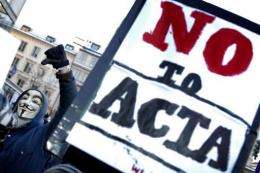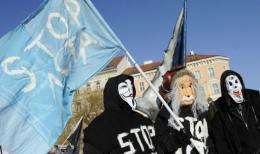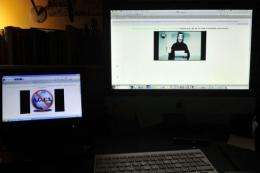European Internet campaigners battle ACTA

A controversial international accord billed as a way to beat online piracy has sparked a fightback led by Internet users in ex-communist countries who say the region's past underlines the need to defend freedom.
An international day of rallies against the Anti-Counterfeiting Trade Agreement (ACTA) has been scheduled for Saturday.
For weeks, the hub of discontent has been Poland, whose centre-right government last week pledged to freeze the ratification process after a storm of protest.
Observers underline that the issue strikes a chord like few others since the fall of the Iron Curtain in 1989.
"I haven't seen such major demonstrations in Poland for 20 years," Warsaw sociologist Adam Ostolski told AFP.
Since late January, thousands of mostly young Poles have taken to the streets nationwide brandishing anti-ACTA and anti-censorship banners.
They have sported the iconic mask of global "hacktivist" group Anonymous, which along with similar organisations has claimed lesson-teaching attacks on official websites.
The real and virtual campaigns, mustered on online social networks, kicked off ahead of the January 26 signature in Tokyo of ACTA by Poland and 21 other European governments.

Poland's decision to freeze ratification has been echoed by its neighbours the Czech Republic and Slovakia.
"Hacktivists" have also launched cyber attacks on the Czech government and Prime Minister Petr Necas's ODS party.
ACTA was negotiated between the 27-nation European Union, Australia, Canada, Mexico, Morocco, New Zealand, Japan, Singapore, South Korea, Switzerland and the United States.
It aims to bolster international standards for intellectual property protection, for example by doing more to fight counterfeit medicine and other goods.
But its attempt to attack illegal downloading and Internet file-sharing has sparked the most controversy, amid fears that it could curtail online freedom.
The debate has been similar to that sparked in the United States over two draft laws, the Protect Intellectual Property Act and Stop Online Piracy Act -- better know by their acronyms PIPA and SOPA -- which led to blacked-out page protests by Wikipedia and other websites.
Governments have come under fire for signing ACTA -- which still needs parliamentary ratification in most countries to come into force -- after talks with record companies and commercial media but not with groups representing Internet users.

Critics say it gives copyright-holders too much clout, for example allowing them to force the closure of websites without the same level of proof as a court would demand.
"Poles are among the most active nations on the Internet and on social networks in Europe," underlined Ostolski.
"For young people who lack much chance of climbing the social ladder, the Internet is one of the last public arenas where they feel free. And then along comes ACTA, and we start controlling that arena. For them, it's a question of freedom, dignity and access to a culture," he added.
History also counts, said Mikulas Ferjencik, deputy leader of the Czech Republic's Pirate Party, based on the Swedish cyber-freedom movement of the same name.
Ferjencik has dubbed ACTA a "serious attack on civil liberties".
"I think people in Eastern Europe started file-sharing much earlier, well before the big corporations even tried to impose a monopoly," he told AFP.
"Then there are other factors, such as our greater experience with censorship and a lack of trust in the state," he added.
In Bulgaria, meanwhile, the noacta-bg.info website claims that "ACTA's aim is to combat copyright infringement on the Internet but in reality it will result in censorship on the last truly free space."
In Western Europe, the anti-ACTA mood has taken longer to spread, making Saturday's rallies a litmus test.
Protests are planned in 54 German cities, as well as in Britain, France and Italy.
(c) 2012 AFP



















